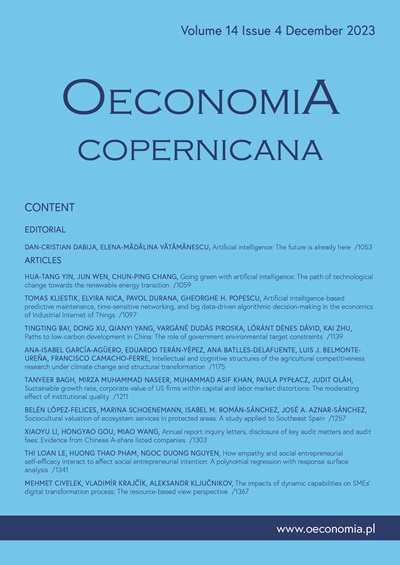Enterprise digital transformation and debt financing cost in China?s A-share listed companies
IF 10.8
1区 经济学
Q1 ECONOMICS
引用次数: 21
Abstract
Research background: The rapid development of digital economy has set off a new wave of enterprise reform. Developing the digital economy is not only an urgent requirement of the current situation, but also an important way to meet the people's better life. Purpose of the article: This paper attempts to reveal the important role of the development of digital technology on the debt financing cost of micro enterprises, and provide micro evidence for the integration of digital economy and real economy. At the same time, this paper wants to provide relevant guidance for formulating digital related policies and reducing the financing cost of the real economy. Methods: Taking China?s A-share listed companies from 2007 to 2020 as a sample, this paper empirically tests the impact of enterprise digital transformation on debt financing cost and its mechanism. In the robustness test, this paper uses the measures of changing independent variables and dependent variables, instrumental variable method and quantile regression method. In the mechanism test, this paper uses the intermediary effect model. In the further study, this paper uses the method of group regression. Findings & value added: The study finds that the digital transformation of enterprises significantly reduces the cost of debt financing. Mechanism tests show that the role of enterprise digital transformation in reducing debt financing costs is mainly realized by reducing information asymmetry and alleviating agency problems. Further tests show that the relationship between enterprise digital transformation and debt financing cost is affected by the degree of market competition, whether it is a high-tech enterprise and audit quality. When the degree of market competition is high, the enterprise is a high-tech one, or it is audited by the four major international accounting firms, the effect of enterprise digital transformation on the reduction of debt financing cost is more significant. The method used in this paper is also applicable to the study of other economic management problems. This paper proves a positive significance of digital transformation, which is conducive to promoting the digital transformation of enterprises. Especially for those enterprises in non-high-tech industries, they should speed up the pace. At the same time, this paper has a certain guiding role for the introduction and implementation of policies to encourage digital transformation.中国企业数字化转型与债务融资成本?s A股上市公司
研究背景:数字经济的快速发展掀起了企业改革的新浪潮。发展数字经济不仅是当前形势的迫切要求,也是满足人民美好生活的重要途径。本文旨在揭示数字技术的发展对微型企业债务融资成本的重要作用,为数字经济与实体经济的融合提供微观证据。同时,本文希望为制定数字相关政策、降低实体经济融资成本提供相关指导。方法:拿中国?以2007-2020年A股上市公司为样本,实证检验了企业数字化转型对债务融资成本的影响及其机制。在稳健性检验中,本文采用了变自变量和因变量的测度、工具变量法和分位数回归法。在机理测试中,本文采用了中介效应模型。在进一步的研究中,本文采用了群回归的方法。研究结果与附加值:研究发现,企业数字化转型显著降低了债务融资成本。机制测试表明,企业数字化转型降低债务融资成本的作用主要通过减少信息不对称和缓解代理问题来实现。进一步的测试表明,企业数字化转型与债务融资成本的关系受市场竞争程度、是否为高新技术企业以及审计质量的影响。当市场竞争程度较高,企业是高科技企业,或者经过四大国际会计师事务所审计时,企业数字化转型对降低债务融资成本的作用更为显著。本文所用的方法也适用于其他经济管理问题的研究。本文论证了数字化转型的积极意义,有利于推动企业数字化转型。特别是对于那些非高科技行业的企业,他们应该加快步伐。同时,本文对鼓励数字化转型政策的出台和实施具有一定的指导作用。
本文章由计算机程序翻译,如有差异,请以英文原文为准。
求助全文
约1分钟内获得全文
求助全文
来源期刊

Oeconomia Copernicana
ECONOMICS-
CiteScore
13.70
自引率
5.90%
发文量
26
审稿时长
24 weeks
期刊介绍:
The Oeconomia Copernicana is an academic quarterly journal aimed at academicians, economic policymakers, and students studying finance, accounting, management, and economics. It publishes academic articles on contemporary issues in economics, finance, banking, accounting, and management from various research perspectives. The journal's mission is to publish advanced theoretical and empirical research that contributes to the development of these disciplines and has practical relevance. The journal encourages the use of various research methods, including falsification of conventional understanding, theory building through inductive or qualitative research, first empirical testing of theories, meta-analysis with theoretical implications, constructive replication, and a combination of qualitative, quantitative, field, laboratory, and meta-analytic approaches. While the journal prioritizes comprehensive manuscripts that include methodological-based theoretical and empirical research with implications for policymaking, it also welcomes submissions focused solely on theory or methodology.
 求助内容:
求助内容: 应助结果提醒方式:
应助结果提醒方式:


